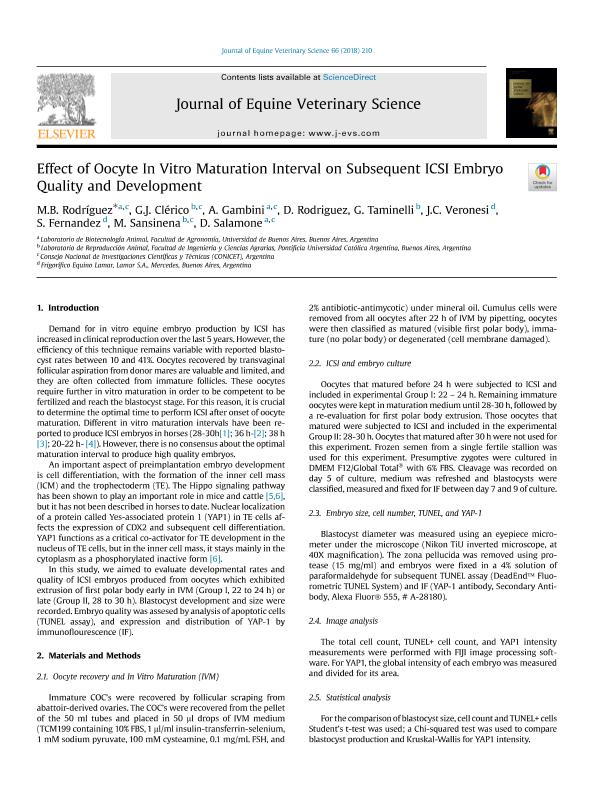Artículo
Effect of Oocyte In Vitro Maturation Interval on Subsequent ICSI Embryo Quality and Development
Rodríguez, M. B.; Clérico, Gabriel José ; Gambini, Andres
; Gambini, Andres ; Rodriguez, Delfina; Taminelli, Guillermo Luis; Veronesi, J. C.; Fernandez, S.; Sansinena, Marina Julia
; Rodriguez, Delfina; Taminelli, Guillermo Luis; Veronesi, J. C.; Fernandez, S.; Sansinena, Marina Julia ; Salamone, Daniel Felipe
; Salamone, Daniel Felipe
 ; Gambini, Andres
; Gambini, Andres ; Rodriguez, Delfina; Taminelli, Guillermo Luis; Veronesi, J. C.; Fernandez, S.; Sansinena, Marina Julia
; Rodriguez, Delfina; Taminelli, Guillermo Luis; Veronesi, J. C.; Fernandez, S.; Sansinena, Marina Julia ; Salamone, Daniel Felipe
; Salamone, Daniel Felipe
Fecha de publicación:
07/2018
Editorial:
Elsevier Science Inc.
Revista:
Journal of Equine Veterinary Science
ISSN:
0737-0806
Idioma:
Inglés
Tipo de recurso:
Artículo publicado
Clasificación temática:
Resumen
Demand for in vitro equine embryo production by ICSI hasincreased in clinical reproduction over the last 5 years. However, theefficiency of this technique remains variable with reported blastocyst rates between 10 and 41%. Oocytes recovered by transvaginalfollicular aspiration from donor mares are valuable and limited, andthey are often collected from immature follicles. These oocytesrequire further in vitro maturation in order to be competent to befertilized and reach the blastocyst stage. For this reason, it is crucialto determine the optimal time to perform ICSI after onset of oocytematuration. Different in vitro maturation intervals have been reported to produce ICSI embryos in horses (28-30h[1]; 36 h-[2]; 38 h[3]; 20-22 h- [4]). However, there is no consensus about the optimalmaturation interval to produce high quality embryos.An important aspect of preimplantation embryo developmentis cell differentiation, with the formation of the inner cell mass(ICM) and the trophectoderm (TE). The Hippo signaling pathwayhas been shown to play an important role in mice and cattle [5,6],but it has not been described in horses to date. Nuclear localizationof a protein called Yes-associated protein 1 (YAP1) in TE cells affects the expression of CDX2 and subsequent cell differentiation.YAP1 functions as a critical co-activator for TE development in thenucleus of TE cells, but in the inner cell mass, it stays mainly in thecytoplasm as a phosphorylated inactive form [6].In this study, we aimed to evaluate developmental rates andquality of ICSI embryos produced from oocytes which exhibitedextrusion of first polar body early in IVM (Group I, 22 to 24 h) orlate (Group II, 28 to 30 h). Blastocyst development and size wererecorded. Embryo quality was assesed by analysis of apoptotic cells(TUNEL assay), and expression and distribution of YAP-1 byimmunoflourescence (IF).
Palabras clave:
EQUINE
,
EMBRYO
,
ICSI
,
MATURATION
Archivos asociados
Licencia
Identificadores
Colecciones
Articulos(SEDE CENTRAL)
Articulos de SEDE CENTRAL
Articulos de SEDE CENTRAL
Citación
Rodríguez, M. B.; Clérico, Gabriel José; Gambini, Andres; Rodriguez, Delfina; Taminelli, Guillermo Luis; et al.; Effect of Oocyte In Vitro Maturation Interval on Subsequent ICSI Embryo Quality and Development; Elsevier Science Inc.; Journal of Equine Veterinary Science; 66; 7-2018; 210-211
Compartir
Altmétricas



